experience的用法
experience的用法
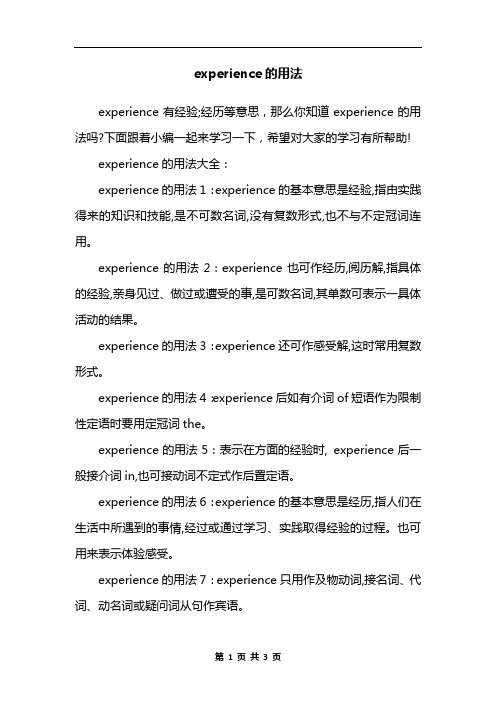
experience的用法experience有经验;经历等意思,那么你知道experience的用法吗?下面跟着小编一起来学习一下,希望对大家的学习有所帮助!experience的用法大全:experience的用法1:experience的基本意思是经验,指由实践得来的知识和技能,是不可数名词,没有复数形式,也不与不定冠词连用。
experience的用法2:experience也可作经历,阅历解,指具体的经验,亲身见过、做过或遭受的事,是可数名词,其单数可表示一具体活动的结果。
experience的用法3:experience还可作感受解,这时常用复数形式。
experience的用法4:experience后如有介词of短语作为限制性定语时要用定冠词the。
experience的用法5:表示在方面的经验时, experience后一般接介词in,也可接动词不定式作后置定语。
experience的用法6:experience的基本意思是经历,指人们在生活中所遇到的事情,经过或通过学习、实践取得经验的过程。
也可用来表示体验感受。
experience的用法7:experience只用作及物动词,接名词、代词、动名词或疑问词从句作宾语。
experience的用法8:experience的过去分词experienced可用作形容词,在句中作定语或表语。
experience的用法例句:1. The most pleasurable experience of the evening was the wonderful fireworks display.这个晚上最让人高兴的就是精彩的焰火表演。
2. Few would argue that this team has experience and proven ability.这个队伍的丰富经验和表现出来的实力是众所公认的。
3. His office was in keeping with his station and experience.他的办公室与其身份和阅历相称。
experience的用法

experience的用法
experience在英文中是指体验、经历或实践的意思,可以有多种用法。
首先,experience可以指外在经历,比如我们说“I had a good experience in my last job.” 意思是我在上一份工作中有一段很好的体验,他可以指具体的实践或某事件情感。
此外,experience有时指抽象的体验,比如:“I had an incredible experience during my trip.”这里的“experience”暗示着我们旅行过程中的感受,兴奋或惊喜。
最后,也可以把experience看做是复合形容词,比如:“It was a thrilling experience.”这里的experience常常会用来形容一段经历,以表明它令人非常兴奋。
总而言之,experience一词有很多用法,表示不同的体验,无论是具体的体验、持续的经历,还是抽象的体验,都可以使用它。
因此,当你想要表达体验类的感受时,就可以用experience这个词来表达。
河南专用中考英语八上第10课时Units9_10

重点短语 1. prepare for 为……做准备 2. another time 其他时间;别的时间 3. hang out 闲逛;常去某处 4. the day before yesterday 前天 5. the day after tomorrow 后天 6. look after 照料;照顾 7. turn down 拒绝 8. take a trip 去旅行
9.invite(v.)→ invitation (n.)邀请;请柬 → invite sb. to do sth. 邀请某人做某事 10.prepare(v.)→ preparation (n.)准备;准备工作 → prepare for 为……做准备 11.surprise(v.)→ surprising (adj.)令人吃惊的;使人惊奇的;奇怪的 → surprised (adj.)惊奇的;感觉意外的 → to one's surprised 令某人吃惊的是 12.open(v.)→ opening (n.)开幕式;落成典礼 anize(v.)→ organization (n.)组织;团体;机构
Tian'anmen
熟词生义讲练
1.catch (v.)捉住,接住;染疾(相当于have);赶上(车、船等);理解;听懂 →caught(过去式/过去分词) 如:catch/have a cold患感冒 He ran quickly so as to catch the last bus.他跑得很快以便赶上末班车。 Mr. Smith, you speak so quickly that I can't catch you.史密斯先生,你说得太快了, 我听不懂。
第10课时 八年级(上) Units 9~10
外研版英语七上Unit 4 Time to celebrate知识清单(默写版)
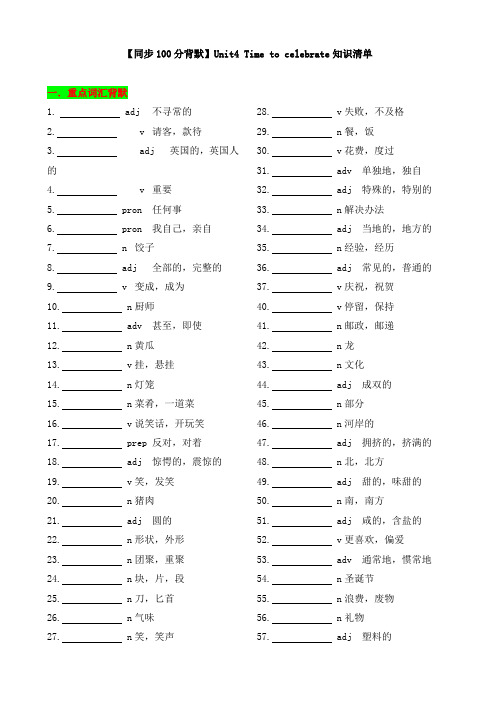
【同步100分背默】Unit4 Time to celebrate知识清单一.重点词汇背默1. adj 不寻常的2. v 请客,款待3. adj 英国的,英国人的4. v 重要5. pron 任何事6. pron 我自己,亲自7. n 饺子8. adj 全部的,完整的9. v 变成,成为10. n 厨师11. adv 甚至,即使12. n 黄瓜13. v 挂,悬挂14. n 灯笼15. n 菜肴,一道菜16. v 说笑话,开玩笑17. prep 反对,对着18. adj 惊愕的,震惊的19. v 笑,发笑20. n 猪肉21. adj 圆的22. n 形状,外形23. n 团聚,重聚24. n 块,片,段25. n 刀,匕首26. n 气味27. n 笑,笑声28. v 失败,不及格29. n 餐,饭30. v 花费,度过31. adv 单独地,独自32. adj 特殊的,特别的33. n 解决办法34. adj 当地的,地方的35. n 经验,经历36. adj 常见的,普通的37. v 庆祝,祝贺40. v 停留,保持41. n 邮政,邮递42. n 龙43. n 文化44. adj 成双的45. n 部分46. n 河岸的47. adj 拥挤的,挤满的48. n 北,北方49. adj 甜的,味甜的50. n 南,南方51. adj 咸的,含盐的52. v 更喜欢,偏爱53. adv 通常地,惯常地54. n 圣诞节55. n 浪费,废物56. n 礼物57. adj 塑料的58. n 污染60. v 能,可能59. v 引起,导致二.重点词汇拓展ual adj.通常的,平常的不平常的通常地,平常地→像平常一样2.treat v.对待,看待治疗,疗法3.I pron.(主格)我我我的我的我自己4.become v.变得;成为→+adj. 变得……→对……产生兴趣5.joke n.笑话→说笑话→开某人玩笑6.piece n.块,片,条→一张;一片;一条;一则7.knife n.小刀;匕首8.spend v.度过;花费→sb. spend some time sth.某人在某事上花费时间→sb. spend some time (in) sth.某人花费时间做某事→sb. spend some money on sth.某人花钱买某物9.alone adj.寂寞的;单身的孤独的,孤单的,寂寞的,荒凉的→感觉孤独10.culture n.文化;文明与文化有关的;文化的11.celebrate v.庆祝庆祝12.south n.南,南方 adj.向南的北方南部的,南方的13.north adj.北的,朝北的n.北方;北北方的;北部的→……的北方三.重点短语背默1.It was in .2.I wanted to , Emilia, to我想给我的英国朋友艾米莉亚吃一顿中国晚餐。
experience的用法大全

experience的用法大全experience的可数与不可数问题第三人称单数:experiences过去分词:experienced复数:experiences现在进行时:experiencing过去式:experienced用作名词,有时可数,有时不可数,注意以下几点:(1) 表示由实践得来的“经验”“体验”等,是不可数名词。
如:Experience is the best teacher. 经验是最好的老师。
You will gain experience in that job. 干那个工作你会获得经验。
(2) 泛指一般意义的个人经历或阅因,也是不可数名词。
如:Experience has matured him greatly. 他经历这些事之后已经成熟多了。
(3) 表示具体的一次经历或体验,为可数名词。
如:It was a very frightening experience. 这是一段令人惊恐的经历。
He had many interesting experiences while traveling in Africa. 他在非洲旅行时,有很多有趣的经历。
表示做某事的经验,其后通常不接不定式,而接 in [of] doing sth。
如:He has had many years’ experience in [of] wheat planting [planting wheat]. 他有多年种小麦的经验。
He has had much experience in [of] this kind of work. 他有丰富的经验做这项工作。
experience 的用法
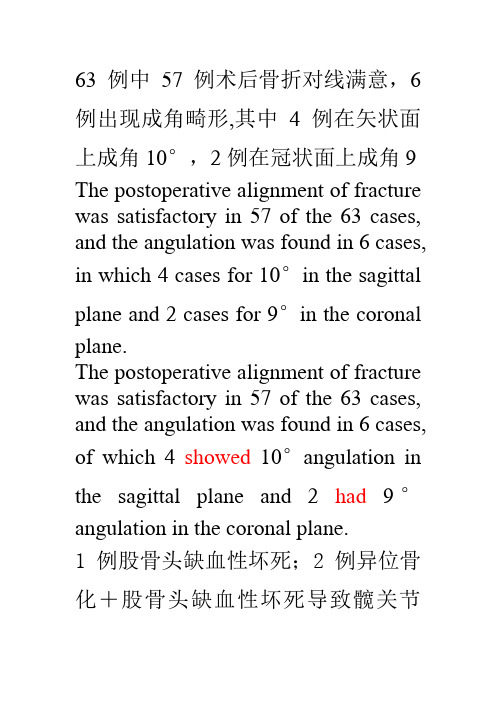
63例中57例术后骨折对线满意,6例出现成角畸形,其中4例在矢状面上成角10°,2例在冠状面上成角9 The postoperative alignment of fracture was satisfactory in 57 of the 63 cases, and the angulation was found in 6 cases, in which 4 cases for 10°in the sagittal plane and 2 cases for 9°in the coronal plane.The postoperative alignment of fracture was satisfactory in 57 of the 63 cases, and the angulation was found in 6 cases, of which 4showed10°angulation in the sagittal plane and 2 had9°angulation in the coronal plane.1例股骨头缺血性坏死;2例异位骨化+股骨头缺血性坏死导致髋关节骨融合。
Ischemia necrosis of femoral head occurred in 1 case, and 2 cases experienced heterotopic ossification with ischemia necrosis of femoral head which led to osseous fusion of hip joint. Ischemia necrosis of femoral head occurred in 1 case, and 2 cases experienced heterotopic ossification with ischemia necrosis of femoral head which led to osseous fusion of hip joint. Conclusion The不同体重患者手术后腰背部疼痛明显缓解、日常生活质量改善,All of the patients had reduction in pain , improvement in activities of daily living.All the patients experienced relief of pain, and improvement in dailyactivities.。
高一英语名词试题答案及解析
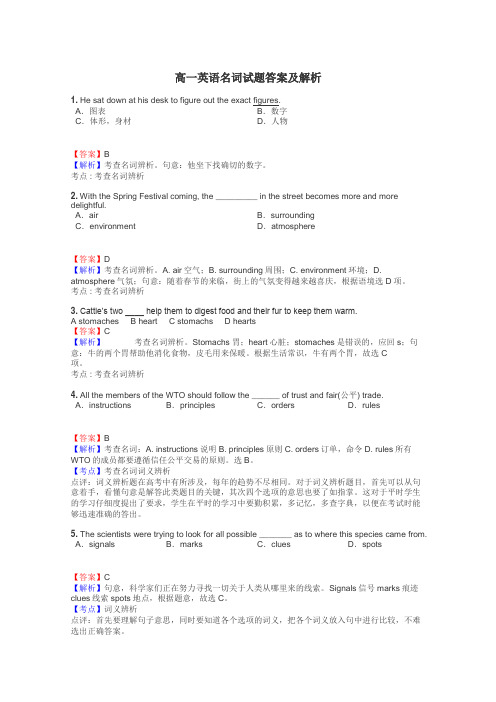
高一英语名词试题答案及解析1. He sat down at his desk to figure out the exact figures.A.图表B.数字C.体形,身材D.人物【答案】B【解析】考查名词辨析。
句意:他坐下找确切的数字。
考点 : 考查名词辨析2. With the Spring Festival coming, the _________ in the street becomes more and more delightful.A.air B.surroundingC.environment D.atmosphere【答案】D【解析】考查名词辨析。
A. air空气;B. surrounding周围;C. environment环境;D. atmosphere气氛;句意:随着春节的来临,街上的气氛变得越来越喜庆,根据语境选D项。
考点 : 考查名词辨析3.Cattle’s two ____ help them to digest food and their fur to keep them warm.A stomachesB heartC stomachsD hearts【答案】C【解析】考查名词辨析。
Stomachs 胃;heart心脏;stomaches是错误的,应回s;句意:牛的两个胃帮助他消化食物,皮毛用来保暖。
根据生活常识,牛有两个胃,故选C项。
考点 : 考查名词辨析4. All the members of the WTO should follow the ______ of trust and fair(公平) trade. A.instructions B.principles C.orders D.rules【答案】B【解析】考查名词:A. instructions说明B. principles原则C. orders订单,命令D. rules所有WTO的成员都要遵循信任公平交易的原则。
experience形容词用法

experience形容词用法形容词在英语语法中是一类用来修饰名词或代词的词类,用于描述名词或代词的性质、特征、状态或程度。
在英语中,形容词通常位于名词之前,用来对名词进行修饰,帮助更准确地表达描述。
在描述“experience”这一名词时,形容词的运用可以丰富句子的表达,使句子更具有生动性和描述性。
以下是一些常见的形容词用法,可以帮助你更好地描述“experience”:1. Positive adjectives:- Wonderful: It was a wonderful experience to visit the Grand Canyon.- Memorable: The trip to Paris was a memorable experience that I will never forget.- Exciting: Skydiving was an exciting experience that got my adrenaline pumping.- Enriching: Volunteering at the local shelter was an enriching experience that taught me a lot about compassion.- Fulfilling: Completing my first marathon was a fulfilling experience that gave me a sense of accomplishment.2. Negative adjectives:- Horrible: The food poisoning during the trip was a horrible experience that ruined the vacation.- Frustrating: Dealing with the technical issues was a frustrating experience that tested my patience.- Disappointing: The concert turned out to be a disappointing experience due to poor sound quality.- Exhausting: The long hours of work were an exhausting experience that left me drained.- Boring: The lecture was a boring experience that made it hard to stay awake.3. Neutral adjectives:- Interesting: The workshop was an interesting experience that broadened my knowledge.- Average: The movie was an average experience that didn't leave a lasting impression.- Routine: The daily commute was a routine experience that I had gotten used to.- Ordinary: The museum tour was an ordinary experience that didn't stand out.- Common: Attending a wedding is a common experience that many people share.4. Intensifying adjectives:- Intense: The survival training was an intense experience that pushed me to my limits.- Profound: The meditation retreat was a profound experience that changed my perspective on life.- Unforgettable: The skydiving experience was unforgettable and left a lasting impression.- Terrifying: The near-death experience was terrifying and shook me to the core.- Life-changing: Studying abroad was a life-changing experience that shaped my future.5. Qualifying adjectives:- Personal: The book club was a personal experience that allowed me to connect with others.- Unique: The cultural exchange program was a unique experience that opened my eyes to different perspectives.- Shared: The team-building workshop was a shared experience that brought us closer together.- Educational: The internship was an educational experience that taught me valuable skills.- Challenging: The obstacle course was a challenging experience that tested my strength and resilience.Overall, the choice of adjectives to describe an experience can greatly impact how it is perceived by others. Whether positive, negative, neutral, intensifying, or qualifying, using the right adjectives can effectively convey the emotions, sensations, and significance of a particular experience. By carefully selecting and using descriptive adjectives, you can paint a vivid picture and evoke a specific response from your audience.。
中考英语 常用词汇详解
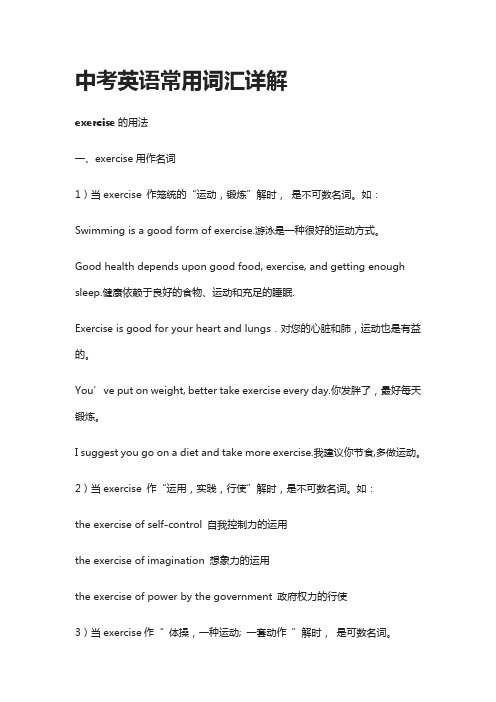
中考英语常用词汇详解exercise的用法一、exercise用作名词1)当exercise 作笼统的“运动,锻炼”解时,是不可数名词。
如:Swimming is a good form of exercise.游泳是一种很好的运动方式。
Good health depends upon good food, exercise, and getting enough sleep.健康依赖于良好的食物、运动和充足的睡眠.Exercise is good for your heart and lungs.对您的心脏和肺,运动也是有益的。
You’ve put on weight, better take exercise every day.你发胖了,最好每天锻炼。
I suggest you go on a diet and take more exercise.我建议你节食,多做运动。
2)当exercise 作“运用,实践,行使”解时,是不可数名词。
如:the exercise of self-control 自我控制力的运用the exercise of imagination 想象力的运用the exercise of power by the government 政府权力的行使3)当exercise作“体操,一种运动; 一套动作”解时,是可数名词。
We do morning exercises every morning. 我们每天上午做早操。
It's good to do eye exercises. 做眼保健操是有好处的。
I do physical exercises every day. 我每天都锻练身体。
Repeat the exercise ten times on each leg.每条腿重复做十次这种动作。
4)当exercise作“练习,习题;实习;(军)演习,操练;”时,是可数名词”。
experience用法及例句

experience用法及例句"Experience"可以作为名词或动词使用,下面是一些常见的用法和例句:
一、作为名词:
-表示经历、体验,例如:
-I had a wonderful experience at the concert last night.(昨晚我在音乐会上有一个很棒的体验。
)
-She has a lot of experience in teaching English.(她在教英语方面有很多经验。
)
-表示经验、阅历,例如:
-He has over20years of experience in the business world.(他在商业领域有超过20年的经验。
)
-Her experience as a lawyer gave her an advantage in the negotiations.(她作为律师的经验使她在谈判中具有优势。
)
二、作为动词:
-表示经历、体验,例如:
-I experienced a earthquake for the first time last year.(去年我第一次经历了地震。
)
-She has experienced many challenges in her life.(她在生活中经历了许多挑战。
)
希望这些例句能够帮助你更好地理解"experience"的用法。
experience用法总结
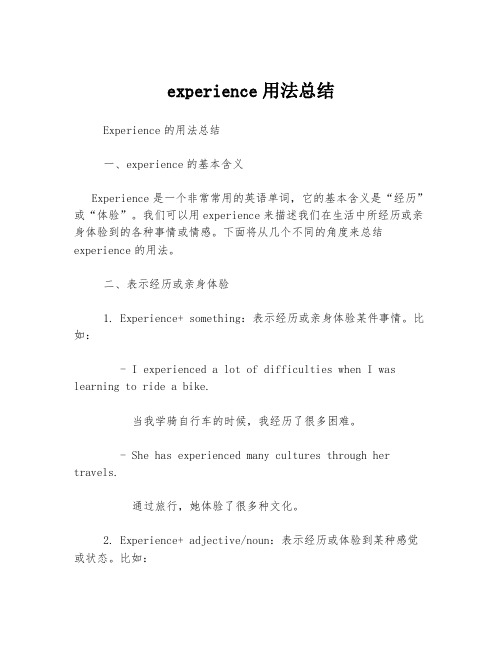
experience用法总结Experience的用法总结一、experience的基本含义Experience是一个非常常用的英语单词,它的基本含义是“经历”或“体验”。
我们可以用experience来描述我们在生活中所经历或亲身体验到的各种事情或情感。
下面将从几个不同的角度来总结experience的用法。
二、表示经历或亲身体验1. Experience+ something:表示经历或亲身体验某件事情。
比如:- I experienced a lot of difficulties when I was learning to ride a bike.当我学骑自行车的时候,我经历了很多困难。
- She has experienced many cultures through her travels.通过旅行,她体验了很多种文化。
2. Experience+ adjective/noun:表示经历或体验到某种感觉或状态。
比如:- She experienced great sadness when her pet passed away.当她的宠物去世时,她体验到了巨大的悲伤。
- He experienced a sense of accomplishment after finishing the marathon.完成马拉松比赛之后,他体验到了成就感。
三、表示技能或知识的具备1. Have/possess experience in + 宾语:表示某人在某个领域具备经验。
比如:- She has a lot of experience in marketing.她在市场营销方面拥有丰富的经验。
- He possesses extensive experience in management.他在管理方面有着广泛的经验。
2. Have/possess experience of + 动名词:表示某人有某种经验或体验。
experience后面动词的用法

经验(experience)是我们在生活中所获取的知识和见解,它可以影响我们的态度、行为和决策。
在英语中,我们经常使用“experience”这个词来描述我们的经历和感受。
今天,我们将深入探讨“experience”后面动词的用法,以帮助我们更好地理解这个主题。
1. “Experience”与“verb”搭配使用当我们谈论我们的经历时,我们经常会使用“experience”和动词的搭配。
“I have experienced the joy of traveling to different countries”、“She has experienced the pain of losing a loved one”等。
在这些例子中,“experience”后面的动词帮助我们更准确地表达了我们的感受和经历。
2. “Verb + experience”和“experience + verb”的区别在英语中,“verb + experience”和“experience + verb”两种结构都是常见的。
但它们表达的含义有所不同。
当动词放在“experience”之前时,强调的是动作本身。
“She experiencedthe thrill of skydiving”。
这句话中,强调了她亲身感受到了跳伞的刺激。
而当动词放在“experience”之后时,强调的是经历或感受。
“I have never experienced feeling so grateful”。
这句话则更强调了对于感恩的深刻体会。
3. “Experience”后面动词的时态和语态变化当我们在叙述过去的经历时,通常会使用过去时态的动词。
“He experienced the joy of graduating fr om university”。
对于进行时态的动作,我们可以说,“She is experiencing the pressure of working in a high-stress environment”。
英语重点语法词汇解experience用法解析

英语重点语法词汇解experience 用法解析核心词汇experience用法解析experience [ɪkˈspɪəriəns] n.经历,经验;v.经历experience译作可数名词“经历”和不可数名词“经验”的区别如下:一、experience翻译为具体的“经历、体验、往事”的时候为可数名词,是指亲身见过、做过或遭受过的事,均可以理解为一次经历过的事,两次经历或多次经历过的事。
可与不定冠词连用:Yesterday afternoon Frank Hawkins was telling me about his experiences as a young man.(新概念英语2,第31课)昨天下午,弗兰克·霍金斯向我讲述了他年轻时的往事。
Her experiences in America make her realize that international cooperation is very important when dealing with COVID-19.她在美国的经历使她意识到当对付新型冠状肺炎的时候,国际合作非常重要。
I had a bad experience with fireworks once.我放烟火有过一次不愉快的遭遇。
I had rather an add experience the other day.前几天我有一个很奇怪的经历。
(前几天我遇到了一件很奇怪的事情。
)Moving had become a common experience for me.搬家对我而言已经成了常事。
It was the worst experience of her life.那是她一生中最糟糕的经历。
Last season was a learning experience for me.上个季度对我来说是一次学习。
Living in Africa was very different from home and quite an experience.生活在非洲完全不同于在家里,那真是一次不同寻常的经历。
高中英语知识点总结归纳
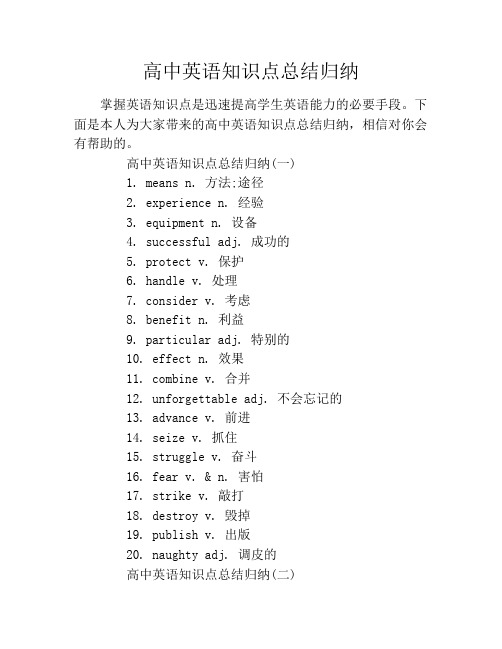
高中英语知识点总结归纳掌握英语知识点是迅速提高学生英语能力的必要手段。
下面是本人为大家带来的高中英语知识点总结归纳,相信对你会有帮助的。
高中英语知识点总结归纳(一)1. means n. 方法;途径2. experience n. 经验3. equipment n. 设备4. successful adj. 成功的5. protect v. 保护6. handle v. 处理7. consider v. 考虑8. benefit n. 利益9. particular adj. 特别的10. effect n. 效果11. combine v. 合并12. unforgettable adj. 不会忘记的13. advance v. 前进14. seize v. 抓住15. struggle v. 奋斗16. fear v. & n. 害怕17. strike v. 敲打18. destroy v. 毁掉19. publish v. 出版20. naughty adj. 调皮的高中英语知识点总结归纳(二)1. get away from 逃离2. watch / look out 注意,当心3. go for a hike / go hiking 去徒步旅游4. as with 正如……一样5. see off 为某人送行6. on the other hand 在另一方面7. take care of 照顾8. get close / near to 接近,凑近9. tree after tree 一棵又一棵的树10. as well as 也,和……一样(好)11. protect…from 保护……不受……的伤害12. be surprised at 因……而吃惊13. be caught / trapped / struck in 被……困住14. take place 发生15. go through 通过,经过;经历(痛苦的事)16. be upon 临近,逼近17. hold on to 紧紧抓住18. refer to 提到,说到;查询(信息)19. look into 注视……的内部;检查,调查20. for fear of (doing) sth. 惟恐……高中英语知识点总结归纳(三)1. advance的用法构词:advanced adj. 高等的.先进的,高深的搭配:① in advance 在前头,预先,事先② in advance of 在……前面;比……进步;超过③ on the advance (物价)在上涨【考例】It is said that Miss White had some difficulty in studying the ____ maths.A. improvedB. developedC. advancedD. increased[考查目标] 本题考查形容词advanced与近义词的区别。
外研版八年级英语上册Module 11讲义(含导入及详细知识点)

M o d ule 11.Way of l i fe一、主题:社会行为/风俗(Soc ial behaviour/custo ms)二、必背单词名词:cap(有檐的)帽子 chess国际象棋se t(同类事物的)(一)套,(一)副,(一)组chopst i ck筷子 toy玩具g i f t礼物 di f fe rence 差别;差异t rad i t ion 传统习俗exa mple例子;实例month 月;月份exper ience 经历;经验 s tay逗留;停留 sandwish三明治;夹心面包片ch ip炸土豆条;炸薯条gent l e man 先生;男士 shou lder肩;肩膀动词:accept收受;接受must必须;应该代词:so meone 某人;有人形容词:v ideo(电子)视频的 serious认真严肃地;不开玩笑的副词:im mediat e ly立即;当即介词:onto 到……之上;向……之上兼类词:surpr i se n.惊奇;意外之事 v.使(某人)吃惊tas te v.有……的味道n.味道;滋味三、常用短语1、a chess se t一副国际象棋2、v ideo ga me 电子游戏3、accept a g i f t接受礼物4、in the West在西方5、Chinese t rad i t i ons中国传统6、for exa mple例如7、do so me c leaning 打扫卫生8、have s th. done 让某人做某事9、the Eng l i sh way o f l i fe英国人的生活方式10、for the f i r s t t i m e 首次;初次11、have a f te rnoon tea喝下午茶12、not jus t…but…不仅………而且………13、tea w i th mi lk 奶茶14、f i sh and ch ips炸鱼加炸薯条15、t rad i t iona l food 传统食物16、push one’s way onto the bus挤上公交车17、stand in a l ine 站成一排18、get on the bus上公交车19、not ice sb. do s th.注意到某人做某事20、touch sb. on the shou lder拍某人的肩膀21、at the age of 在……岁22、on the……s ide of the road 在马路的……边四、重点句型1、表示否定转移的句型:I don’t t hink I shou ld open i t now,2、表示吃惊的句型:(1)W hat a su rp r i se!(2)You can’t be ser ious!3、提出建议的句型:(1)And you mustn’t break anyth ing.(2)And you’d better not haveyour ha i r cut dur ing the Spr ing Fes t i va lm o nth.(3)Let’s ce lebrate L ing l ing’s b i r t hday f i r s t!五、模块语法情态动词 must、can 和 need 的用法(You must say Mr or Mrs when you meet so meone for the f i r s t t ime./You can take i t away./ You needn’t wa i t!)M o d ule 11.W a y of l i fe详细笔记1.Here’s your g i f t.这是给你的礼物。
高一英语名词试题
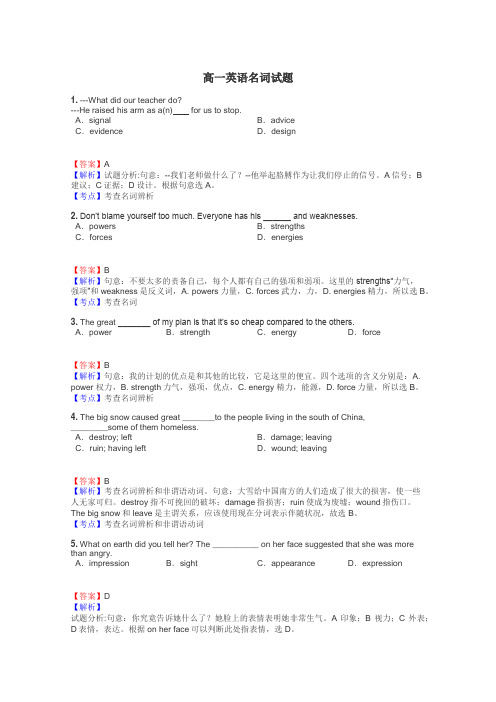
高一英语名词试题1. ---What did our teacher do?---He raised his arm as a(n) for us to stop.A.signal B.adviceC.evidence D.design【答案】A【解析】试题分析:句意:--我们老师做什么了?--他举起胳膊作为让我们停止的信号。
A信号;B建议;C证据;D设计。
根据句意选A。
【考点】考查名词辨析2.Don’t blame yourself too much. Everyone has his ______ and weaknesses.A.powers B.strengthsC.forces D.energies【答案】B【解析】句意:不要太多的责备自己,每个人都有自己的强项和弱项。
这里的strengths“力气,强项”和weakness是反义词,A. powers力量,C. forces武力,力,D. energies精力,所以选B。
【考点】考查名词3. The great _______ of my plan is that it’s so cheap compared to the others.A.power B.strength C.energy D.force【答案】B【解析】句意:我的计划的优点是和其他的比较,它是这里的便宜。
四个选项的含义分别是:A. power 权力,B. strength力气,强项,优点,C. energy 精力,能源,D. force力量,所以选B。
【考点】考查名词辨析4. The big snow caused great _______to the people living in the south of China,________some of them homeless.A.destroy; left B.damage; leavingC.ruin; having left D.wound; leaving【答案】B【解析】考查名词辨析和非谓语动词。
外研版八年级英语上册Module 11讲义(含导入及详细知识点)
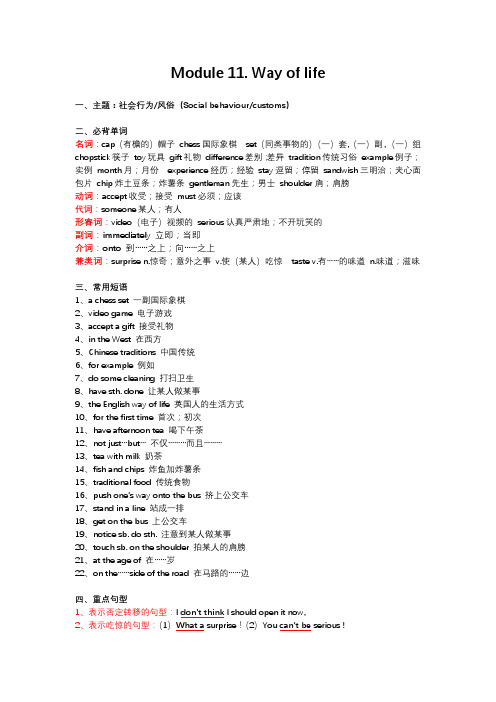
Module 11. Way of life一、主题:社会行为/风俗(Social behaviour/customs)二、必背单词名词:cap(有檐的)帽子chess国际象棋set(同类事物的)(一)套,(一)副,(一)组chopstick筷子toy玩具gift礼物difference差别;差异tradition传统习俗example例子;实例month月;月份experience经历;经验stay逗留;停留sandwish三明治;夹心面包片chip炸土豆条;炸薯条gentleman先生;男士shoulder肩;肩膀动词:accept收受;接受must必须;应该代词:someone某人;有人形容词:video(电子)视频的serious认真严肃地;不开玩笑的副词:immediately 立即;当即介词:onto 到……之上;向……之上兼类词:surprise n.惊奇;意外之事v.使(某人)吃惊taste v.有……的味道n.味道;滋味三、常用短语1、a chess set 一副国际象棋2、video game 电子游戏3、accept a gift 接受礼物4、in the West 在西方5、Chinese traditions 中国传统6、for example 例如7、do some cleaning 打扫卫生8、have sth. done 让某人做某事9、the English way of life 英国人的生活方式10、for the first time 首次;初次11、have afternoon tea 喝下午茶12、not just…but… 不仅………而且………13、tea with milk 奶茶14、fish and chips 炸鱼加炸薯条15、traditional food 传统食物16、push one’s way onto the bus 挤上公交车17、stand in a line 站成一排18、get on the bus 上公交车19、notice sb. do sth. 注意到某人做某事20、touch sb. on the shoulder 拍某人的肩膀21、at the age of 在……岁22、on the……side of the road 在马路的……边四、重点句型1、表示否定转移的句型:I don’t think I should open it now,2、表示吃惊的句型:(1)What a surprise!(2)You can’t be serious !3、提出建议的句型:(1)And you mustn’t break anything.(2)And you’d better not have your hair cut during the Spring Festivalmonth.(3)Let’s celebrate Lingling’s birthday first !五、模块语法情态动词must、can和need的用法(You must say Mr or Mrs when you meet someone for the first time./You can take it away./ You needn’t wait!)Module 11.Way of life详细笔记1.Here’s your gift.这是给你的礼物。
undergo用法和搭配
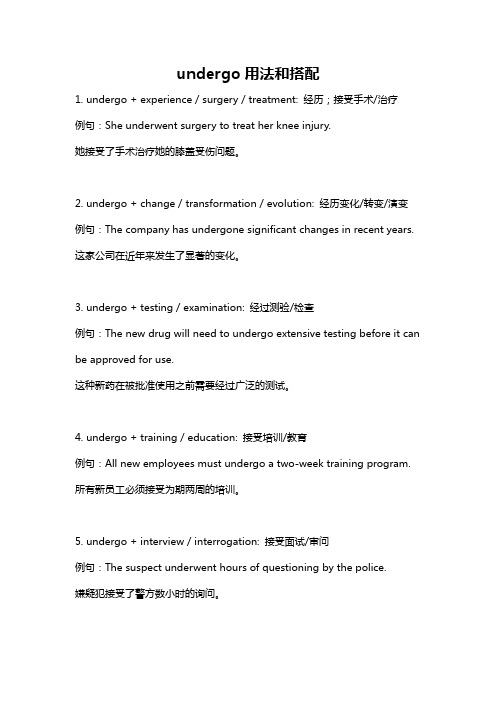
undergo用法和搭配1. undergo + experience / surgery / treatment: 经历;接受手术/治疗例句:She underwent surgery to treat her knee injury.她接受了手术治疗她的膝盖受伤问题。
2. undergo + change / transformation / evolution: 经历变化/转变/演变例句:The company has undergone significant changes in recent years. 这家公司在近年来发生了显著的变化。
3. undergo + testing / examination: 经过测验/检查例句:The new drug will need to undergo extensive testing before it can be approved for use.这种新药在被批准使用之前需要经过广泛的测试。
4. undergo + training / education: 接受培训/教育例句:All new employees must undergo a two-week training program. 所有新员工必须接受为期两周的培训。
5. undergo + interview / interrogation: 接受面试/审问例句:The suspect underwent hours of questioning by the police.嫌疑犯接受了警方数小时的询问。
6. undergo + hardship / difficulty: 经历困难/困苦例句:The refugees have undergone great hardship during their journey to safety.难民在逃离到安全地带的旅途中经历了各种困苦。
exp用法
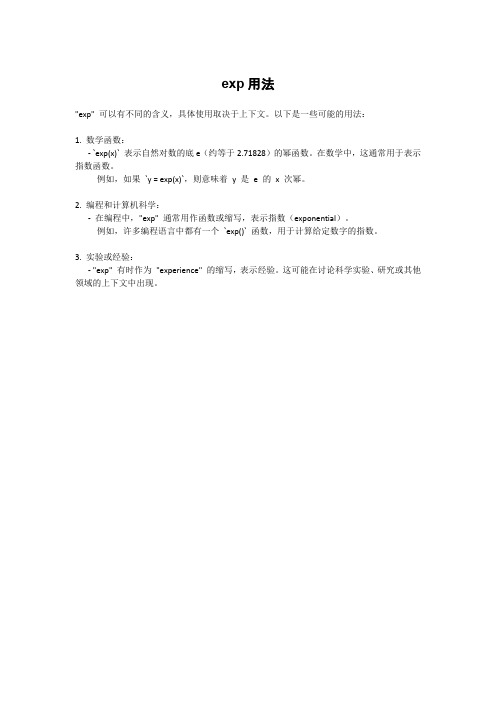
exp用法
"exp" 可以有不同的含义,具体使用取决于上下文。
以下是一些可能的用法:
1. 数学函数:
- `exp(x)` 表示自然对数的底e(约等于2.71828)的幂函数。
在数学中,这通常用于表示指数函数。
例如,如果`y = exp(x)`,则意味着y 是e 的x 次幂。
2. 编程和计算机科学:
-在编程中,"exp" 通常用作函数或缩写,表示指数(exponential)。
例如,许多编程语言中都有一个`exp()` 函数,用于计算给定数字的指数。
3. 实验或经验:
- "exp" 有时作为"experience" 的缩写,表示经验。
这可能在讨论科学实验、研究或其他领域的上下文中出现。
- 1、下载文档前请自行甄别文档内容的完整性,平台不提供额外的编辑、内容补充、找答案等附加服务。
- 2、"仅部分预览"的文档,不可在线预览部分如存在完整性等问题,可反馈申请退款(可完整预览的文档不适用该条件!)。
- 3、如文档侵犯您的权益,请联系客服反馈,我们会尽快为您处理(人工客服工作时间:9:00-18:30)。
experience的用法
experience英音:[iks'piəriəns]美音:[ɪk'spɪrɪəns]
名词n.
1. 经验,体验[U][(+of/in)]
She had no experience of life at all.
她毫无生活经验。
Have you had any experience of teaching English
你有过教英语的经验吗
2. 经历,阅历[C]
Please tell us about your experiences in Africa.
请跟我们谈谈你在非洲的经历。
I had a rather odd experience the other day.
前些天我有过一次相当奇怪的经历。
及物动词vt.
1. 经历;体验
The city experienced over 2,000 such incidents last year. 去年这座城市发生过二千次以上这类事件。
2. 感受;遭受
He experienced a pang of sadness.
他感到一阵悲痛。
save的用法save英音:[seiv]美音:[sev]
及物动词vt. 1. 救,挽救[(+from)]
He saved me from drowning. 他救了我,使我免遭溺死。
The doctor saved the child's life. 这位医生挽救了孩子的生命。
2. 节省,省去;避免[O1][(+from)]
The computer will save us a lot of time. 电将使我们省下许多时间。
These robots will save us a lot of labor.
这些机器人可以节省我们大量劳工。
3. 储蓄;储存[(+for)]
4. 保留[O1][(+for)]
He promised to save a room for me. 他答应给我留个房间。
5. 维护,保全
6. 救(球),阻碍对方得(分)
不及物动词vi. 1. 储蓄;积蓄[(+up/for)]
We've been saving for five years to buy a house.
为了买房子,我们已储蓄了五年。
2. 节省,节约
3. 救,挽救
名词n. 1. 救球[C]
介词prep. 1. 除...之外
The shop is open save on Sundays.
那家商店除星期日外都营业。
连接词conj.
1. 只是,要不是
2. (用在从句主语前)除了
work的用法
名词n.
1. 工作;劳动;作业;事[U]
It takes a lot of work to dig a deep well. 挖一口深井很费事。
2. 职业,业务[U]
3. (待做的)工作;功课[U]
I have to bring my work home today. 今天我得把工作带回家做。
4. 成果,产品;工艺品,针线活[U]
This bamboo basket is my own work. 这只竹篮是我自己编的。
5. 著作,作品[P1][S1]
He is making a study of William Faulkner's works. 他在研究威廉·福克纳的作品。
6. 行为;作用[U]
The scribbles on the wall must be the work of those children.
墙壁上的涂鸦准是那几个孩子画的。
7. 【物】功[U]
8. 工厂[P][J]
9. (建筑等)工程[P]
10. 活动的机件[P]
11. 【口】相关的所有事物[the P]
不及物动词vi.
1. 工作,劳动,干活[(+at/on)]
She works in a restaurant. 她在一家饭店工作。
2. (机器等)运转,活动
The machine won't work. 机器不转了。
3. (由于使用等)逐渐变动;慢慢地前进[Q]
4. 起作用;行得通
Your suggestion works well. 你的建议很有效。
5. 发酵
及物动词vt.
1. 使工作,使干活[O]
Don't work yourself to death. 别拼命做了。
2. 开动;操作
Please tell me how to work the machine. 请告诉我如何操纵这机器
3. 通过努力取得;靠做工取得[O]
4. 使缓慢前进;使逐渐变动[O][O8]
Can you work the screw loose 你能使这个螺钉松开吗
5. 造成,引起;激起
This scientist worked miracles. 这位科学家创造了奇迹。
6. 【口】安排
7. 经营,管理
He worked the farm with great success. 这个农场他经营得很成功。
8. 影响;说服[O]
I'll try to work him to my way of thinking. 我要设法说服他同意我的想法。
9. 精工细做10. 计算,算出[(+out)]
Job的用法
名词n. [C] 1. 工作;职业
She has a job at a children's hospital. 她在儿童医院工作。
He is just the man for the job. 他做这事儿很合适。
2. 零工He did all kinds of odd jobs. 他做各种零活。
3. 费力的事情[S] The new building was a big job. 新大楼是项大工程。
4. 分内事,职责[S]
It's your job to raise funds. 筹措资金是你的事情。
5. 【口】成果,成品[S1]
His new novel is a superb job. 他的新小说是一部佳作。
6. 【俚】犯罪行为(尤指抢劫)
He got three years for pulling a job in Hong Kong. 他因在香港行窃被判刑三年。
不及物动词vi.
1. 做零工
2. 做股票经纪
3. 假公济私
及物动词vt. 1. 代客买卖(股票等);批发(商品等) 2. 承包 3.用假公济私的手段办理He jobbed his son into the position. 他用舞弊手段为儿子谋得这个职位。
4. 临时租进和出租
5. 【美】【俚】欺骗
形容词 a. 1. 临时雇用的
名词n.
1. 约伯(男子名)
2. 约伯(《圣经》故事人物)
3. 约伯记(《圣经·旧约》中的一卷)。
